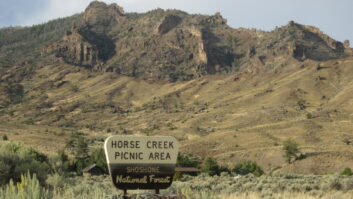FCC Tees Up Some Late-Summer Business
Aug 1, 2014 1:42 AM, Lee Petro
While the rest of Washington is on vacation, the FCC has teed up several issues to keep broadcasters busy over the next several months. First, the FCC released a Notice of Proposed Rulemaking to make further changes to the Emergency Alert System in the wake of the 2011 national EAS test. During the 2011 test, certain problems arose from conducting a nationwide EAS test, including the lack of a location code for nationwide tests. While each U.S. state and territory has its own geographic code, the current FCC rules do not have a geographic code to be used for nationwide alerts. During the 2011 test, the code for Washington, D.C., was used, but some equipment rejected the test alert because it was not local. The FCC has proposed to use �000000� as the code for future nationwide alerts, which should not require substantial reprogramming of EAS equipment.
The FCC is also proposing to create a National Period Test code that would be used instead of the Emergency Action Notification that was used in the 2011 test. The NPT would eliminate the confusion arising from whether the future use of the EAN was a test or a real emergency. The proposed NPT would be similar to the EAN, but would not be limited in duration, which would permit more extensive testing and the distribution of information. The FCC is also looking to strengthen its rules to ensure that people with disabilities are aware of future testing. To that end, it is considering the adoption of a text crawl requirement similar to the FCC”s current closed captioning rules. Comments in this proceeding are due on Aug. 14, and reply comments are due on Aug. 29.
Next, as reported last month, the FCC”s Media Bureau had said at the June FCC Meeting that it would releasing a public notice dealing with the first group of mutually-exclusive low-power FM applications. On July 9 the FCC released the public notice and also opened a filing window for applications listed in the public notice to file major modification amendments to their applications in order to eliminate conflicts. Petitions to deny the tentative selectees are due by Aug. 8.
The major change amendment filing window opened on July 10, and will close on Oct. 8. During this window, those applications listed in the public notice, which comprises 79 groups in the western states (AZ, CA, CO, HI, KS, MO, NE, NV, OR, SD, TX, UT, WA), may file amendments. The applicants can file both non-adjacent channel changes and site relocations of greater than 5.6 kilometers in order to eliminate conflicts. However the amendments may not create new conflicts with other pending LPFM applications. The Public Notice also listed all of the LPFM stations in the region that had requested second-adjacent waiver requests, and the full-power FM stations to which the waiver requests apply.
Finally, on July 18, the FCC released a public notice regarding a petition for rulemaking filed by SSR Communications Inc., to create a new class of FM stations and to make other changes to the FCC”s spacing rules. The new class � C4 � would fit between the Class A and Class C3 allotments, and would permit a maximum height above average terrain of 100 meters and maximum ERP of 12 kW.
The rulemaking also proposes the adoption of a �show cause� procedure by which facilities that are operating below the maximum power and height for their respective class for more than 10 years could be subject to reclassification as a Section 73.215 station. This approach is similar to the Class C0 FM rules, and the reclassification could be avoided by tendering a minor change application by the targeted station within 180 days. Comments on this petition for rulemaking are due no later than Aug. 18.
FCC Dateline
Aug. 1, 2014 � Stations in California, Illinois, North Carolina, South Carolinaand Wisconsin must place Annual EEO Reports in public file.
Aug. 1, 2014 � Noncommercial Radio stations in Illinois and Wisconsinmust file Ownership Report (FCC Form 323E) with FCC.
Sept. 5, 2014 � Lowest Unit Charge obligations commence for politicaladvertisements by candidates for federal, state, and local races for thegeneral election to be held on Nov. 4, 2014.










